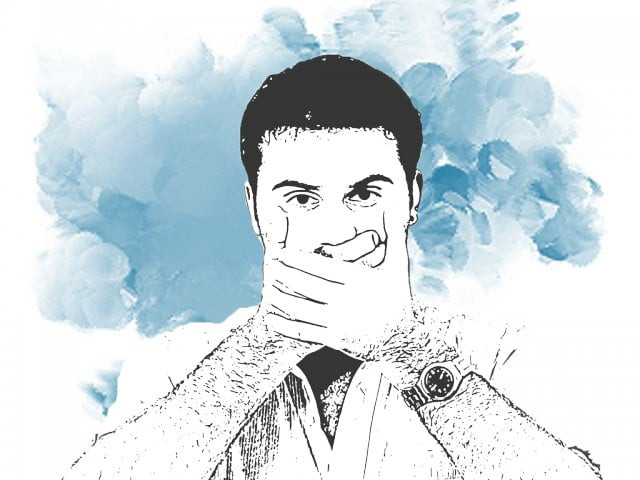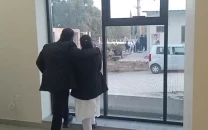Press freedom day: Editorial line vs Bottom line
Those who still consider journalism as a “mission” are in the minority.

News items are cut short in print to make room for ads; with election fever at its peak, the time for talk shows is limited to 30 minutes to account for commercial breaks. DESIGN: SUNARA NIZAMI
“It’s been said that a country gets the kind of government which it deserves. With equal truth it can be said that the country gets the kind of press it deserves. If the politics of country is dirty, its press cannot be immune from it.”
These were the observations made in 1954 by the first and the only Press Commission in Pakistan, and they’re still true today. This is perhaps the biggest challenge our media faces after a 63 year struggle for the freedom of the Press, a struggle that was led by highly professional journalists and editors.
Media today has joined the bandwagon of corrupt politicians, bureaucracy, generals and commercial and business interest to the detriment of journalistic ethics. Those who still consider journalism as a “mission” are in the minority.
The greatest challenges are: (1) Corruption (2) Absence of editors’ institution, (3) Commercial interests overriding editorial/ethical consideration, (4) Extremism and threats endangering the freedom to write and speak, and (5) Rising political interest in the media.
If we manage to address the first three challenges we will be able to overcome others as well.
Recently, a list was made public containing names of journalists and the sums of money purportedly handed out to them, including for travelling on the PM’s official tours as well as the information ministry’s official functions and special assignments. Some 15 journalists denied that they were paid or said their names were wrongly mentioned because they never accompanied the PM on that tour.
But has anybody, including PFUJ, APNS, CPNE, PBA and Press Council of Pakistan, taken any position on their “relationship” with the information ministry.
I was anxiously awaiting an announcement from any of these bodies that in future its members would not travel on government expense on official tours; that if they would send anyone, they would bear the costs themselves. I was expecting the leading media houses to come out in public and denounce the ministry of information and issue future guideline. I was hoping that at least the PFUJ would declare that they would not accept any favour from the ministry.
Unfortunately, it is business as usual. No one wants this profitable ministry abolished.
I don’t see any cut in the information budget or see any possibility that official media will get independence to the extent of editorial freedom with reasonable restrictions. Only the PTI has promised to abolish the ministry. In the past, the PPP also had made such promises, so one must wait and see if the PTI will deliver. Unlike other South Asian countries, Pakistan’s struggle for press freedom has been an epic one. Today, even though there is no censorship, the news gets censored – not by a government department, but thanks to commercial consideration and political relationships.
News items are cut short in print to make room for ads; with election fever at its peak, the time for talk shows is limited to 30 minutes to account for commercial breaks. In the next ten days, we will hardly see news on the back page as parties have booked full back pages. In years to come, we might see full front page ad and a one-liner: “please see the news on the back page.”
Commercial success is essential, but one must realise that the commercials follow the content and not vice versa. Rising political interference through commercial ventures is dangerous for free media, and has damaged the cause of the freedom of the press.
If a second media commission is set up (I have my doubt the present one can do it), its finding and observation on ethics, working conditions, commercial interests and relationship with governments would be an eye opener. I don’t think this is going to happen, so the ethical journalists must continue their fight for the crucial phase of this endless struggle.
The writer is the Director Current Affairs at Express News. Previously he has served as Director News, ARYNEWS. He has also served as secretary general, PFUJ.
Published in The Express Tribune, May 3rd, 2013.



















COMMENTS
Comments are moderated and generally will be posted if they are on-topic and not abusive.
For more information, please see our Comments FAQ